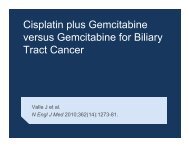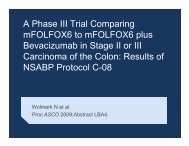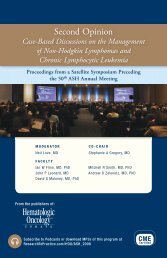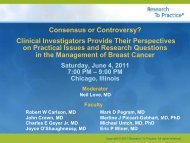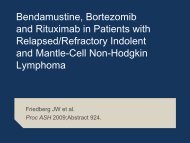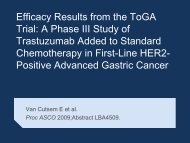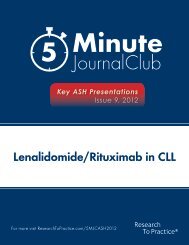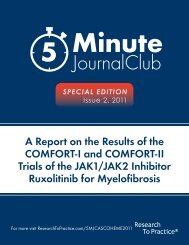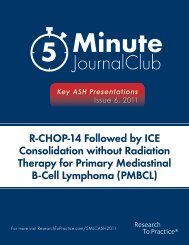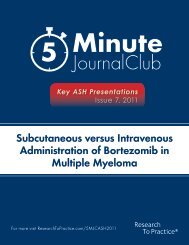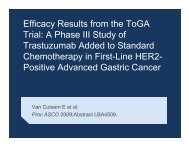C O N TENT VA LIDATION A ND D IS C LOSURE SResearch To Practice (RTP) is committed to providing its participants with high-quality, unbiased andstate-of-the-art education. We assess potential conflicts of interest with faculty, planners and managersof CME activities. Real or apparent conflicts of interest are identified and resolved through a conflict ofinterest resolution process. In addition, all activity content is reviewed by both a member of the RTPscientific staff and an external, independent physician reviewer for fair balance, scientific objectivity ofstudies referenced and patient care recommendations.FACULTY — Dr Winer had no real or apparent conflicts of interest to disclose. The following faculty(and their spouses/partners) reported real or apparent conflicts of interest, which have been resolvedthrough a conflict of interest resolution process: Dr Burris — Consulting Agreements: Bristol-Myers Squibb Company, Celgene Corporation, Genentech BioOncology, GlaxoSmithKline, ImCloneSystems Incorporated, Novartis Pharmaceuticals Corporation, Roche Laboratories Inc, Sanofi-Aventis.Prof Crown — Speakers Bureau: GlaxoSmithKline, Pfizer Inc, Sanofi-Aventis. Dr Gradishar — AdvisoryCommittee: Abraxis BioScience, AstraZeneca Pharmaceuticals LP, Bristol-Myers Squibb Company,Eisai Inc, Genentech BioOncology, GlaxoSmithKline, Novartis Pharmaceuticals Corporation, Pfizer Inc;Consulting Agreements: Abraxis BioScience, Amgen Inc, AstraZeneca Pharmaceuticals LP, Bristol-Myers Squibb Company, Eisai Inc, Genentech BioOncology, GlaxoSmithKline, Novartis PharmaceuticalsCorporation, Pfizer Inc. Dr Gralow — Consulting Agreements: Amgen Inc, Genentech BioOncology,Genomic Health Inc, GlaxoSmithKline, Novartis Pharmaceuticals Corporation, Roche LaboratoriesInc, Sanofi-Aventis. Dr Hayes — Paid Research: AstraZeneca Pharmaceuticals LP, GlaxoSmithKline,Novartis Pharmaceuticals Corporation, Pfizer Inc. Dr Mamounas — Advisory Committee: AbraxisBioScience, Bayer Pharmaceuticals Corporation, Bristol-Myers Squibb Company, Eli Lilly andCompany, Genentech BioOncology, Genomic Health Inc, GlaxoSmithKline, Novartis PharmaceuticalsCorporation, Pfizer Inc, Sanofi-Aventis; Consulting Agreement: Roche Laboratories Inc; SpeakersBureau: Eli Lilly and Company, Genentech BioOncology, Genomic Health Inc, Pfizer Inc, Sanofi-Aventis. Dr Miller — Consulting Agreements: Eli Lilly and Company, Genentech BioOncology, RocheLaboratories Inc; Paid Research: Pfizer Inc, Roche Laboratories Inc; Speakers Bureau: GenentechBioOncology, Roche Laboratories Inc. Dr O’Shaughnessy — Consulting Agreements: Biogen Idec,GlaxoSmithKline; Speakers Bureau: Abraxis BioScience, AstraZeneca Pharmaceuticals LP, Bristol-Myers Squibb Company, Eli Lilly and Company, Sanofi-Aventis. Dr Ravdin — Consulting Agreement:Genomic Health Inc; Speakers Bureau: AstraZeneca Pharmaceuticals LP; Stock Ownership:Adjuvant! Inc, Bristol-Myers Squibb Company, Pfizer Inc, Wyeth. Dr Sledge — Advisory Committee:Genentech BioOncology, GlaxoSmithKline, Novartis Pharmaceuticals Corporation; ConsultingAgreement: Genentech BioOncology; Paid Research: Eli Lilly and Company, Sanofi-Aventis. Dr Swain— Foundation Grant: Genentech BioOncology; Paid Research: Bristol-Myers Squibb Company; PaidTravel: Sanofi-Aventis.MODERATOR — Neil Love: Dr Love is president and CEO of Research To Practice, which receivesfunds in the form of educational grants to develop CME activities from the following commercialinterests: Abraxis BioScience, AstraZeneca Pharmaceuticals LP, Aureon Laboratories Inc, BayerPharmaceuticals Corporation/Onyx Pharmaceuticals Inc, Biogen Idec, Bristol-Myers Squibb Company,Celgene Corporation, Cephalon Inc, Eisai Inc, Eli Lilly and Company, Genentech BioOncology, GenomicHealth Inc, Genzyme Corporation, GlaxoSmithKline, ImClone Systems Incorporated, Merck andCompany Inc, Millennium Pharmaceuticals Inc, Novartis Pharmaceuticals Corporation, Ortho BiotechProducts LP, OSI Oncology, Pfizer Inc, Roche Laboratories Inc, Sanofi-Aventis, Synta PharmaceuticalsCorp and Wyeth.RESEARCH TO PRACTICE STAFF AND EXTERNAL REVIEWERS — The scientific staff and reviewersfor Research To Practice have no real or apparent conflicts of interest to disclose.This educational activity contains discussion of published and/or investigational uses of agents that arenot indicated by the Food and Drug Administration. Research To Practice does not recommend the useof any agent outside of the labeled indications. Please refer to the official prescribing information for eachproduct for discussion of approved indications, contraindications and warnings. The opinions expressedare those of the presenters and are not to be construed as those of the publisher or grantors.If you would like to discontinue your complimentary subscription to Breast Cancer Update, pleaseemail us at Info@ResearchToPractice.com, call us at (800) 648-8654 or fax us at (305) 377-9998.Please include your full name and address, and we will remove you from the mailing list.2
MANAGEMENT OF METASTATIC BREAST CANCERFrom the practice of Abraham B Schwarzberg, MDA 38-year-old premenopausal woman was diagnosed with a 2-cm, Grade III, ER/PRpositive,HER2-positive IDC. CT scan revealed a 1.8-cm nodule in the left lobe of theliver, and biopsy confirmed metastatic disease. The remainder of this patient’s workupwas negative.Select Excerpts from the DiscussionTrack 37DR LOVE: Kathy, what’s your approach to treating patients presentingwith asymptomatic metastatic breast cancer?DR MILLER: I have several patients in my practice who presented withmetastatic disease at the time of initial diagnosis. In the long-term follow-upseries from MD Anderson, a small group of patients were potentially cured,or were at least long-term survivors, of their metastatic disease. These womenwere predominantly treated with anthracycline-based chemotherapy, along withhormonal therapy if appropriate. We do not know how to identify these women,but they did not have multiple, bulky sites of symptomatic disease or less than acomplete response to systemic therapy.I tell patients that in general, metastatic disease is not curable but that Ihave seen exceptions. Among younger women with limited, asymptomaticmetastatic breast cancer, it is reasonable to assume that a few will be long-termsurvivors. A key component is to achieve a complete response to the initialsystemic therapy, so I would begin with an aggressive treatment plan. Theremainder of our decisions will follow from how well she responds to the initialtherapy.For this patient with HER2-positive disease, I would consider the TCHregimen. She also would be eligible for the ECOG-E1105 study, whichrandomly assigns patients to paclitaxel/trastuzumab and optional carboplatinwith or without bevacizumab. I have a patient enrolled on E1105 who is similarto this 38-year-old woman. If she demonstrates a complete response to chemotherapy,we will proceed to local therapy for her primary tumor and continuedtherapy with trastuzumab and hormonal therapy.If she doesn’t experience a complete response, then the best data suggestthat she doesn’t have the possibility of long-term survival and we need to shiftour goals to preserving the quality of her life while still trying to extend thequantity of her life. So we would perhaps make different decisions about localtherapy, about the use of more aggressive hormone therapy and about how longwe might continue the trastuzumab.3



